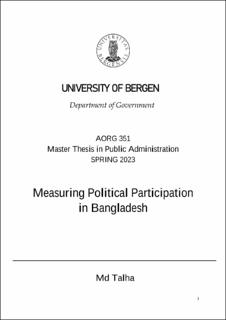Measuring Political Participation in Bangladesh
Master thesis
Permanent lenke
https://hdl.handle.net/11250/3072767Utgivelsesdato
2023-06-02Metadata
Vis full innførselSamlinger
- Master theses [88]
Sammendrag
Political participation is one of the fundamental driving forces of democracy. While traditionally it was only voting and party campaigning, nowadays it goes beyond all of the primary forms of participation and sometimes private actions, for instance, writing a critic against the ruling party on social media or chatting with friends regarding the new policy taken by the prime minister also considered as a form of political participation. In the case of Bangladesh, studies regarding political participation mostly assessed depending on the voting turnout. This study, therefore, focuses on measuring the level of political participation in Bangladesh beyond voting. This research then tries to determine ‘what’ factors explain political participation in Bangladesh? This study has adopted the civic voluntarism/ social resource and cultural motivation approach, the modernist approach, and mobilizing agency approach. Based on these approaches, this study developed four explanatory variables: trust, performance, discrimination, and corruption. In addition to that, this research also uses various socio-demographic variables to explain how that variate political participation. The study used data collected by the Government and Trust Survey (GTS) in 2020 in Bangladesh and managed by the University of Bergen and North South University, funded by the Norwegian Research Council. The findings show that the level of political participation in Bangladesh is very low (20%), excluding vote, and citizens' involvement in one action tends to influence them to engage in other activities, except refusing to pay tax. Twenty percent (25%) of people participated in modern/informal forms, and the other eighty percent 75% were active in formal/conventional forms of participation. The civic voluntarism model most successfully explained different variables, and the modernist approach did it partially, where mobilizing agency theory failed to explain. Whereas trust, performance and corruption can explain political participation in Bangladesh along with different socio-demographic factors. Higher trust and performance perception leads to less participation, and less corruption perception influences higher participation. In terms of socio-demography, more education derives toward more participation, whereas higher religiosity leads to less participation.
Utgiver
The University of BergenOpphavsrett
Copyright the Author. All rights reservedBeslektede innførsler
Viser innførsler beslektet ved tittel, forfatter og emneord.
-
Participation in forestry: A study of people`s participation on the social forestry policy in Bangladesh: Myth or reality?
Chowdhury, Saber Ahmed (Master thesis, 2004)This study is an attempt to study and explore the extent of people’s participation in theSF policy of Bangladesh and what are the roles of the main stakeholders: bureaucrats,Union Parishad and NGOs in ensuring the expected ... -
Community participation in school development: Understanding participation in basic school performance in the Nanumba district of Ghana
Adam, Fusheini (Master thesis, 2005)This study has been an attempt to look at the impact of community participation on the performance of basic schools in Ghana, specifically the Nanumba District of the Northern Region. As a government policy under the ... -
Oral participation in the EFL classroom: A study of variables that might affect students’ oral participation in the Norwegian upper-secondary EFL classroom
Austnes, Anna Marøy (Master thesis, 2020-03-07)Engelsk er i dag rekna som eit globalt språk som brukast i store delar av verda. Difor er det naturleg at det er fokus på kommunikasjon i engelskfaget i skulen (Utdanningsdirektoratet 2013). I denne oppgåva ser eg på munnleg ...
